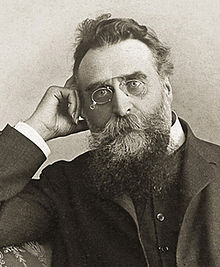Jonas Basanavičius
Jonas Basanavičius (born November 23, 1851 in Ožkabaliai , district Vilkaviškis ; † February 16, 1927 in Vilnius ) was a Lithuanian doctor , scientist and politician .
Life
Jonas Basanavičius was born into a middle peasant family. He attended the Marijampolė High School . Against the wishes of his parents, who wanted to see him in the seminary, he enrolled in the philological-historical faculty of Moscow State University in 1873 . After a year he moved to the medical faculty, where he also received a scholarship. In 1879 he finished the university as a doctor.
Since there was no opportunity for employment in Lithuania, he accepted an offer to work in Bulgaria . From 1880 he worked as a clinician in Lom . In addition to his medical work, he devoted himself to political issues, wrote for Lithuanian magazines and was a co-initiator of the newspaper Aušra . He also dealt with ethnological topics and history. Some important essays on Bulgarian ethnography come from his pen , partly in comparison with Lithuanian conditions. He was particularly interested in the question of the origin of the Lithuanians - Basanavičius advocated the thesis that they come from the Danube region and that they are closely related to the Thracians . For this purpose, he visited museums, libraries and archives all over Europe and maintained extensive correspondence.
During further studies in Prague he met his future wife Eleonore, who died of tuberculosis shortly after their marriage in 1889 . Basanavičius narrowly escaped an assassination attempt, the background of which remained unclear, but which was probably politically motivated. After further work in Varna , Lom and Elena , he returned to Lithuania in 1904. In 1907, on his initiative, the Mokslo draugija ('Science Society') was founded, which later became the Lithuanian Academy of Sciences . On February 16, 1918 he was one of the signatories of the Lithuanian Declaration of Independence .
In 1927 he died in Vilnius, where he is buried in the Rasos cemetery.
Works
Basanavičius was involved in the collection of fairy tales , sagas , folk songs , names of diseases, etc. a. Some he collected, others he received by mail - in some cases he paid for the collectors, such as his brother Vincas. The collected folklore and articles on the topic are currently being edited in a 15-volume edition: Jono Basanavičiaus tautosakos biblioteka Vilnius, 1993.
reception
Basanavičius is considered by polls to be the most influential Lithuanian of the 20th century. The Basanavičius Prize is the most valuable award ( LTL 31,000 ) for scientists and cultural workers in the field of folklore and ethnology in Lithuania.
Web links
| personal data | |
|---|---|
| SURNAME | Basanavičius, Jonas |
| BRIEF DESCRIPTION | Lithuanian doctor, scientist and politician |
| DATE OF BIRTH | November 23, 1851 |
| PLACE OF BIRTH | Ožkabaliai, Russian Empire |
| DATE OF DEATH | February 16, 1927 |
| Place of death | Vilnius |

